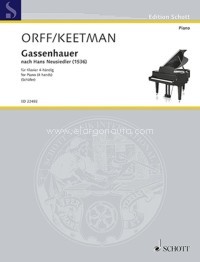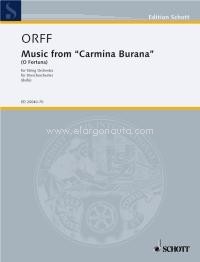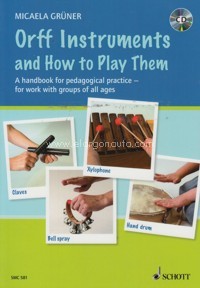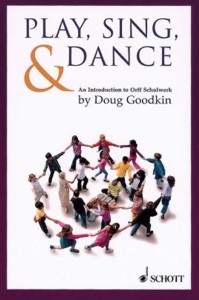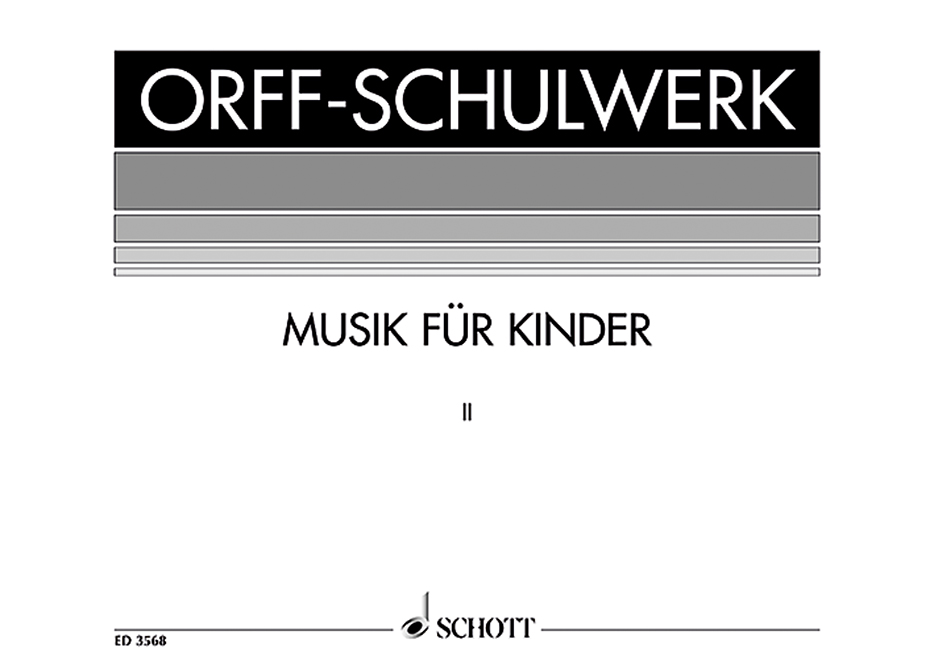
Music for Children, volume 2 (American Edition)
Keetman, Gunild
;Orff, Carl
Schott Musik International. 1991Ficha técnica
- EAN: 9780930448004
- ISBN: 978-0-930448-00-4
- Editorial: Schott Musik International
- Fecha de edición: 1991
- Encuadernación: Espiral
- Dimensiones: 23,5x28,5
- Idioma: Inglés
- Nº páginas: 240
Impresión bajo demanda
Disponibilidad sujeta a la información del editorPVP. 59,90€
Añadir a la Lista de deseos
Instrumentation: Voice Part, Recorder and Percussion
Edition: score for voice and/or instruments
Series: Orff-Schulwerk - Music for Children (American Edition)
Orff-Schulwerk: Music for Children has proved itself to be a stimulating source of material for music teaching. Carl Orff's fundamental educational ideas have revitalized music education in nursery schools, at all levels of primary and secondary education and in special music schools, based on the concepts that: - music, dance and language are inter-related and animated through rhythm. - when children discover, invent, improvise and compose, their experience of music is intensified. These creative activities are complementary to those of interpreting and listening to music. - all who take part are encouraged to contribute, not only vocally but also instrumentally. - the Orff approach to music education is many sided; it is concerned with practical music-making, it provides fundamental experiences and it lays the foundation for a comprehensive musical training. - movement games and activities for body awareness in space, time and flow, lead to movement improvisation and dance forms. - music and dance have been notated in many different ways in history. Various ways of writing down sounds and music, as well as playing from and interpreting different kinds of sources are being explored.
Today, countless teachers and institutions are using these ideas. More and more teachers look for ways of invovling their students in active music making. In particular, they seek to challenge their pupils' creativity by the use of music, dance and speech - as media of human expression - as a foundation of all education.
A prerequisite for work in Orff-Schulwerk is the artistic and pedagogical training of teachers. The Orff Institute was founded in 1961 as a Department of the 'Mozarteum', in Salzburg, Austria. Training offered includes a four-year diploma course, a two-year post-graduate course, and a one-year-course in English.
At the opening of the Orff Institute in Salzburg in 1963, Carl Orff ended his speech with a quotation from Schiller: 'I have done my part, now do yours.' That challenge has been taken up by teachers worldwide.
American Edition
It was in the mid-1950s that the ideas which Carl Orff established in his "Schulwerk" first achieved prominence in the United States and Canada; the publication in 1956 of Doreen Hall and Arnold Walter's adaption into english represented the first venture in applying the original Carl Orff/Gunild Keetman work towards the needs of a different language and educational culture.
The new American Edition, developed twenty years later to meet the needs of a country with an immensely rich cultural and ethnic heritage, demanded a large and diverse team of collaborators to draw upon this wealth. Carl Orff and his publishers entrusted Hermann Regner from the Orff Institute in Salzburg with the concept and co-ordination of the series; in this way, the Edition would profit from the experience gained from all parts of the world in this adaption of Orff's pedagogical ideas.
The three volumes of the American Edition contain a wide range of both traditional and new material (speech exercises, games, dances, texts, songs with instrumental pieces, information on how to use the material). Orff-Schulwerk is not a method that should be followed page by page; it is a collection of material that invites original arrangements or variations and the composition of complementary and contrastiong material.
It mirrors a vision of an education which considers music and dance not as a 'fringe programme' but essential for our entire being. These media '...are, in all world cultures, as important for survival as water and air. Man becomes an entity again when he makes music and when he dances; he uses his hands and feet, his body, his senses, his intellect and emotion.' (Hermann Regner, in the Foreword to Volume 1 of the American Edition)
This edition follows the tradition of Schulwerk editions from other countries and contains some vocal and instrumental material from the original Schulwerk. However, most of the material has been contributed by leading educators using material developed in American classrooms, that reflects the vast panorama of the cultural heritage of the United States. Photographs and sample lessons illustrate the work. In all volumes there are several articles, each dealing with a specific topic within the field of Music and Dance Education. These unique volumes provide a rich and varied source of material which will stimulate the imagination of Orff-Schulwerk teachers everywhere.
Contributors of Volume 2: Tossi Aaron, Arnold E. Burkart, Isabel Carley, Gerald P. Dyck, Nancy Ferguson, Jane Frazee, Ruth Pollock Hamm, Maureen Kennedy, Susan Kennedy, Marcia Lunz, Joachim Matthesius, Grace Nash, Erik Nielsen, Sue Ellen Page, Martha Pline Polon, Jacobeth Postl, Pat Riello, Konnie Saliba, Miriam Samuelson, Donald Slagel, Judith Thomas, Martha Maybury Wampler


